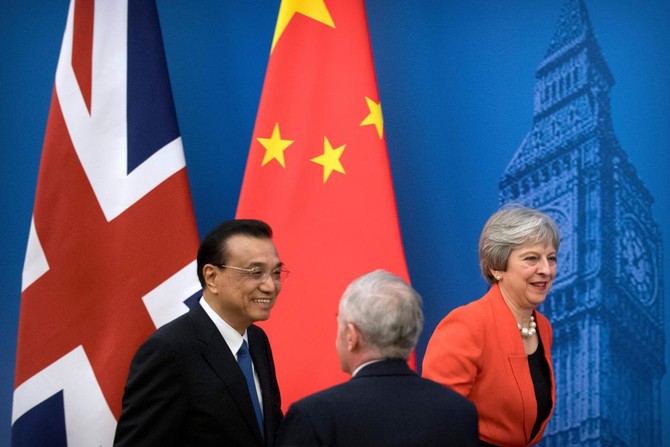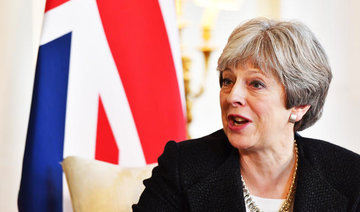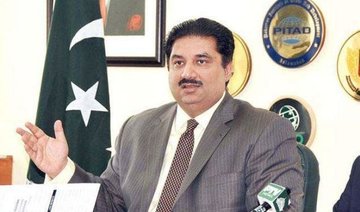BEIJING: British Prime Minister Theresa May on Wednesday called for expanding the “global strategic partnership” between the United Kingdom and China, at the start of a visit to the world’s second-largest economy focused on hashing out new trade arrangements once the UK leaves the European Union.
Meeting with Chinese Premier Li Keqiang, May referred to “a golden era” in relations between the two countries that London hopes will bring vast amounts of new job-creating investment from China’s fast-growing global firms.
“This is an auspicious time of the year to ... think about and consider how we can build further on that golden era and on the global strategic partnership that we have been working on between the UK and China,” May said.
Officials oversaw the signing of a raft of agreements covering trade — including the import of British food products to China — investment, education and other areas. More than 155,000 Chinese students now study in the UK, according to the British government.
Brexit appeared to figure prominently in the talks and May said that as Britain prepares to leave the EU “we are committed to deepening our strong and vital partnership” with China.
“And that relationship is indeed broad and deep and delivers benefits to both countries,” May said.
As Britain prepares to leave the EU, “we will become a country that is able to operate an independent trade policy and is able to sign free trade agreements around the rest of the world,” she said at a later question-and-answer session with Li.
Li said Brexit would not change the basic trading relationship.
“In EU-UK relations. We will have assessments and discussions in our trade relationship to take it forward,” Li said.
As she makes her China visit, May’s job is under threat from rivals within her Conservative Party, who are divided over whether to make a clean break with the EU or seek to keep the closest-possible economic relationship.
May insisted to reporters flying with her to China, “I’m not a quitter.”
She said there was “a long-term job to be done” by her government, according to the Press Association news agency.
“That job is about getting the best Brexit deal, it’s about ensuring that we take back control of our money, our laws, our borders, that we can sign trade deals around the rest of the world,” she said. “But it’s also about our domestic agenda.”
In her meeting with Li, May said the two countries, both permanent members of the UN Security Council, were also cooperating on North Korea and other security challenges. North Korea’s nuclear weapons program, she said, is “illegal, reckless and poses an unacceptable threat to international security.”
Li said they also discussed overcapacity in the steel industry, while May said an agreement had been reached to open China to imports of British beef this year. Business deals worth more than 9 billion pounds ($13 billion) would be announced before the end of the visit, May said.
May also expressed support for British involvement in the “Belt and Road” initiative, China’s mega-plan for trade and infrastructure links across Asia.
However, she said related projects needed to adhere to established global business practices. Beijing has been criticized for undermining those rules by agreeing to finance major infrastructure projects on condition they were awarded to Chinese companies without entertaining bids from competitors.
“We’ve discussed how the UK and China will continue to work together to identify how best we can cooperate on the Belt and Road initiative across the region and ensure it meets international standards,” May said.
“We will work together to encourage free and fair trade, ensure a transparent, rules-based multilateral trading system, and build an open global economy that works for all.”
May first visited the central industrial city of Wuhan on Wednesday before traveling to Beijing for talks with Li. On Thursday, she is scheduled to meet with President Xi Jinping, whose 2015 state visit to Britain helped propel what China refers to as the golden era in ties.
May is being accompanied on her visit by 50 British business leaders, including the chief executives of Jaguar Land Rover and drug firm AstraZeneca. She will also visit the financial hub of Shanghai before heading home Friday.
Bolstering ties with China became more urgent after Britain voted in 2016 to leave the EU, compelling it to forge new trade agreements outside of the 28-nation bloc.
British exports to China are up 60 percent since 2010, and China is expected to be one of the UK’s biggest foreign investors by 2020.
British finance minister Philip Hammond visited in December, pledging to promote London as a center for transactions in China’s yuan currency and announcing up to 25 billion pounds ($35 billion) in support for British businesses involved in the Belt and Road initiative.
But May appears more cautious about embracing Chinese investment than her predecessor, David Cameron. She annoyed Beijing in 2016 by temporarily delaying approval for a Chinese-backed nuclear power plant in southwestern England.
On China visit, Britain’s Theresa May focused on post-Brexit future
On China visit, Britain’s Theresa May focused on post-Brexit future

UN chief slams ‘disturbing rise in anti-Muslim bigotry’ worldwide

- International Day to Combat Islamophobia marked annually on March 15
- Day established by General Assembly in 2022 to raise awareness of global issue
NEW YORK: The UN marked the International Day to Combat Islamophobia on Friday, with Secretary-General Antonio Guterres condemning “a disturbing rise in anti-Muslim bigotry” worldwide.
In remarks delivered to the UN General Assembly by his Chief of Staff Courtenay Rattray, Guterres expressed concern over the increasing discrimination, exclusion and violence faced by Muslims globally, particularly as they observe the holy month of Ramadan.
“From racial profiling and discriminatory policies that violate human rights, to outright violence against individuals and places of worship,” Guterres underscored that these attacks on Muslims are part of a broader “scourge” of rising extremism, intolerance and violence against religious groups and other vulnerable communities.
The International Day to Combat Islamophobia was established by the UNGA on March 15, 2022.
The resolution, introduced by Pakistan on behalf of the Organization of Islamic Cooperation, was adopted to raise awareness of the growing global issue of Islamophobia.
The day aims to address the rise in anti-Muslim sentiment and foster a global commitment to combat discrimination, exclusion and violence against Muslims.
The secretary-general’s message also emphasized the importance of safeguarding human rights, asserting that attacks on any group threaten the rights and freedoms of all.
“We must reject and eradicate bigotry in all its forms,” the statement urged, calling for governments to protect religious freedom, foster social cohesion, and address the rise of hate speech and harassment on digital platforms.
“We must all speak out against xenophobia, discrimination, and bigotry,” Guterres added, urging a global commitment to building inclusive societies where people can live peacefully regardless of faith.
Anti-Russian activist shot dead in Odesa, Ukrainian authorities say

- They did not name the 31-year-old victim but Ukrainian media said it was Demian Hanul
- Also posted on the local Telegram channel was a video clip claiming to capture the moment of the shooting
KYIV: An unknown gunman shot dead on Friday a prominent anti-Russian activist in the Ukrainian port city of Odesa, Ukraine’s law enforcement authorities said.
They did not name the 31-year-old victim but Ukrainian media said it was Demian Hanul, a blogger who took part in the 2014 Maidan revolution against Ukraine’s then pro-Russian president and was once a member of the radical far-right Right Sector group.
“The incident is qualified as a premeditated murder committed by order,” the national police said on the Telegram messaging app.
Also posted on the local Telegram channel was a video clip claiming to capture the moment of the shooting. It showed a burly man holding a gun to the head of a man lying on a pavement, possibly already dead, firing, and then walking away.
Reuters could not verify the authenticity of the clip.
Ukraine’s interior minister said he had received “specific clues” to help track down the suspect and that the head of the national police was heading to Odesa to lead the investigation.
Russian state media has previously branded Hanul “a neo-Nazi responsible for the arson attack on the Trade Union House in Odessa,” a reference to deadly fighting between pro-Russian activists and supporters of Ukrainian unity in May 2014.
A Moscow court charged Hanul in absentia in April 2024 with several crimes including damaging Soviet-era war monuments for which he would have faced up to 20 years in prison.
Several media outlets reported last July that Hanul had requested Ukrainian police protection after receiving threats.
Finland jails Russian for life over 2014 ‘war crimes’ in Ukraine

- The Helsinki district court found Vojislav Torden, a commander of the Russian neo-Nazi paramilitary group Rusich, guilty of “four different war crimes” committed in Lugansk
- The prosecution had accused Torden of five counts of war crimes that resulted in the deaths of 22 Ukrainian soldiers
HELSINKI: A Finnish court on Friday sentenced a Russian neo-Nazi to life in prison on war crimes charges stemming from a 2014 clash in Ukraine, with Kyiv hailing the ruling as a “key milestone.”
The Helsinki district court found Vojislav Torden, a commander of the Russian neo-Nazi paramilitary group Rusich, guilty of “four different war crimes” committed in the Lugansk region of eastern Ukraine.
His lawyer, Heikki Lampela, told Finnish media that Torden was surprised by the ruling and would appeal it.
The prosecution had accused Torden of five counts of war crimes that resulted in the deaths of 22 Ukrainian soldiers.
The court dismissed the main count, which argued the Rusich forces ambushed a convoy of two vehicles, a truck and a car, carrying Ukrainian soldiers on September 5, 2014.
As other groups were also present, the court said the prosecution had not proven that Rusich and Torden were responsible for the ambush.
However, Torden was found guilty of leading the actions of Rusich’s soldiers at the scene following the ambush and of killing one wounded soldier.
He was also found guilty of authorizing fighters to mutilate Ivan Issyk by cutting the symbol used by the group — the kolovrat, or “spoked wheel” — into his cheek.
The emblem is often used by ultranationalist and neo-Nazi groups in Russia and Eastern Europe. Issyk died as a result of his wounds.
Torden was also found guilty of having taken derogatory photos of a fallen soldier at the scene and posting it to social media.
The office of the Ukraine’s prosecutor general on Friday hailed the court’s decision as “a key milestone in holding perpetrators of grave violations of international humanitarian law accountable.”
“Ukraine remains committed to working with partners worldwide to ensure there is no impunity for war criminals,” it said in a statement posted on social media.
According to Finnish public broadcaster YLE, Torden was arrested by Finnish border guards at Helsinki airport as he tried to leave the country in August 2023.
He was on the EU sanctions list and banned from entering Finland.
Ukraine had sought Torden’s extradition, which Finland’s supreme court rejected, citing the risk of him not receiving a fair trial and suffering inhumane conditions in prison.
In October last year, Finland’s National Bureau of Investigation (NBI) completed a comprehensive probe launched in December 2023.
The investigation involved close cooperation with Ukrainian prosecutors and security services as well as Europol, the International Criminal Court and Eurojust — the European Union Agency for Criminal Justice Cooperation.
Finland applies “universal jurisdiction,” a legal principle allowing it to bring charges on its soil for suspected serious crimes committed anywhere in the world.
‘Strong G7 unity’ on Ukraine in talks: host Canada

- “We were able to find strong G7 unity on a variety of issues … in particular is the one linked to Ukraine,” Joly said
CHARLEVOIX, Canada: Group of Seven foreign ministers reached a unified statement backing US-led calls for a ceasefire between Ukraine and Russia, host Canada said Friday, despite friction with President Donald Trump.
“I can say that through our long conversations, we were able to find strong G7 unity on a variety of issues that were discussed and one that I would like to highlight in particular is the one linked to Ukraine,” Canadian Foreign Minister Melanie Joly told reporters on the last day of the talks in Quebec.
UK police extend detention of North Sea crash captain

- Police were granted two extensions on Wednesday and Thursday
- Police cited the location of both vessels at sea as one of the complications facing the probe
LONDON: UK police Friday again extended the detention of the captain of a cargo ship which struck a tanker in the North Sea, citing the “complexities” of the case.
The Russian captain was arrested Monday on suspicion of gross negligence manslaughter after his ship, the Solong, slammed into the tanker anchored off the coast of Hull in northeastern England, setting both ships ablaze and leaving one sailor presumed dead.
Police were granted two extensions on Wednesday and Thursday to allow more time to question the 59-year-old captain due to “the complexities of the incident,” the local Humberside police force said in a statement.
Police cited the location of both vessels at sea as one of the complications facing the probe, with the ships on fire for several days after the incident, requiring a massive firefighting response.
While all crew onboard the jet fuel-laden tanker, the US-flagged Stena Immaculate, were safely rescued, one sailor from the Portuguese-flagged Solong remains missing and presumed dead.
Although the government has ruled out foul play, investigators are still determining the causes of the crash, in which the Solong never deviated from its course and slammed into the Stena at 16 knots an hour.
Pockets of fire were still being reported on the deck of the Solong on Thursday evening, according to the UK Coast Guard.
“Extensive lines of enquiry are continuing,” police said.
Salvage teams boarded the vessels on Thursday to carry out initial damage assessments.






















